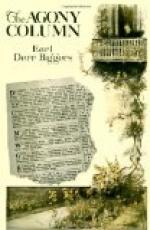But Washington is far from London, isn’t it? And it is London that interests us most—though father’s constituents must not know that. It is really a wonderful, an astounding city, once you have got the feel of the tourist out of your soul. I have been reading the most enthralling essays on it, written by a newspaper man who first fell desperately in love with it at seven—an age when the whole glittering town was symbolized for him by the fried-fish shop at the corner of the High Street. With him I have been going through its gray and furtive thoroughfares in the dead of night, and sometimes we have kicked an ash-barrel and sometimes a romance. Some day I might show that London to you—guarding you, of course, from the ash-barrels, if you are that kind. On second thoughts, you aren’t. But I know that it is of Adelphi Terrace and a late captain in the Indian Army that you want to hear now. Yesterday, after my discovery of those messages in the Mail and the call of Captain Hughes, passed without incident. Last night I mailed you my third letter, and after wandering for a time amid the alternate glare and gloom of the city, I went back to my rooms and smoked on my balcony while about me the inmates of six million homes sweltered in the heat. Nothing happened. I felt a bit disappointed, a bit cheated, as one might feel on the first night spent at home after many successive visits to exciting plays. To-day, the first of August dawned, and still all was quiet. Indeed, it was not until this evening that further developments in the sudden death of Captain Fraser-Freer arrived to disturb me. These developments are strange ones surely, and I shall hasten to relate them.
I dined to-night at a little place in Soho. My waiter was Italian, and on him I amused myself with the Italian in Ten Lessons of which I am foolishly proud. We talked of Fiesole, where he had lived. Once I rode from Fiesole down the hill to Florence in the moonlight. I remember endless walls on which hung roses, fresh and blooming. I remember a gaunt nunnery and two-gray-robed sisters clanging shut the gates. I remember the searchlight from the military encampment, playing constantly over the Arno and the roofs—the eye of Mars that, here in Europe, never closes. And always the flowers nodding above me, stooping now and then to brush my face. I came to think that at the end Paradise, and not a second-rate hotel, was waiting. One may still take that ride, I fancy. Some day—some day—
I dined in Soho. I came back to Adelphi Terrace in the hot, reeking August dusk, reflecting that the mystery in which I was involved was, after a fashion, standing still. In front of our house I noticed a taxi waiting. I thought nothing of it as I entered the murky hallway and climbed the familiar stairs.
My door stood open. It was dark in my study, save for the reflection of the lights of London outside. As I crossed the threshold there came to my nostrils the faint sweet perfume of lilacs. There are no lilacs in our garden, and if there were it is not the season. No, this perfume had been brought there by a woman—a woman who sat at my desk and raised her head as I entered.




